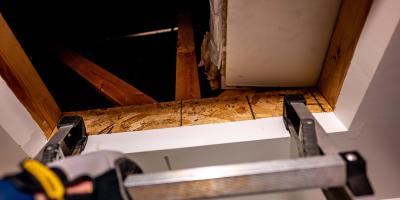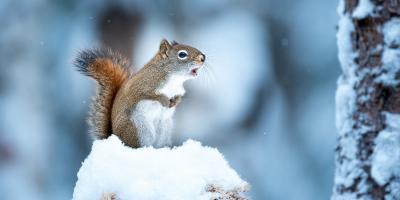It's a Bird, It's a Plane, Nope, It's a Flying Squirrel

If you’ve noticed a sudden surge in strange noises coming from your attic, it’s possible that flying squirrels have taken up residence and are looking to increase their numbers. During the February and March mating season, flying squirrels become more active, which accounts for the added noise above.
Check out the following for more flying squirrel facts… and help for getting rid of them.
Fast Facts About Flying Squirrels
Flying squirrels are fascinating creatures, but that doesn’t mean you want them in your home. There are two species of flying squirrel found in North America, with New England being home to the Northern Flying Squirrel.
But, “flying” is a bit of a misnomer. Although it does look like these small mammals are able to fly, the truth is when they take to the air they do so by gliding. A more accurate name might be “gliding squirrels,” thanks to the membrane connecting their front and back legs, which helps them glide upon jumping. The benefit of this feature is that it keeps the squirrels clear of ground-lurking predators.
Although they don’t hibernate during the winter, they aren’t as active... at least not until mating season kicks off in February. Given that flying squirrels are very social and prefer to live in groups, once they gain entry into your home, it won’t be long before you hear quite a racket coming from the walls and/or attic.
Flying Squirrels Will Find a Way...
...Into your home, that is. Usually, they are able to get in via small cracks and holes in residential structures, and often these access points are so small that most homeowners would never even notice them. Of course, this proves problematic because you can’t fix a problem you’re not aware of. As soon as the squirrels have found a way into your home, they are quick to nest and start growing their families. Although they only mate an average of once per year, flying squirrels have between 1-6 babies per litter, typically 2-4.
Sound the Alarm
Given their social and active nature, it’s not surprising that the types of sounds you might hear coming from the attic or within the walls include scampering, running, and scurrying from one spot to another. If you hear these noises, it’s time to call your pest management professional and send those squirrels packing… safely.
Expert Exclusion Safeguards the Squirrels
At JP Pest Services, we pride our efforts on permanently solving your squirrel situation without causing harm to the creatures themselves. Using one-way excluder doors, we are able to relocate the squirrels out of your attic and back outside. Once removed, including any nests or young, our team locates and seals any access points to stop the squirrels from returning.
If flying squirrels have found their way into your home, reach out to our pest management professionals for a fast, effective, and squirrel-friendly solution.



